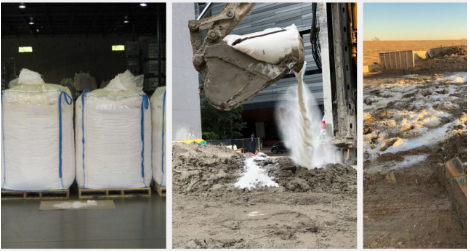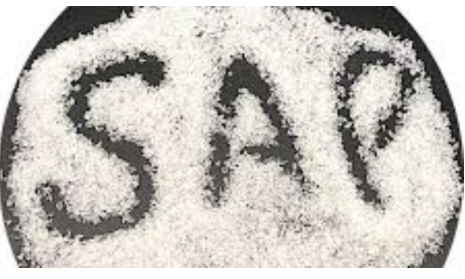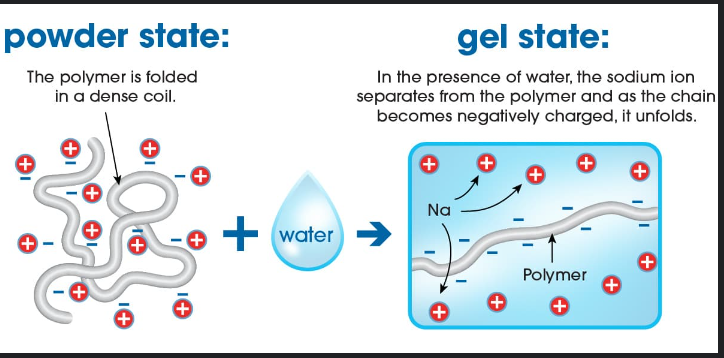With the water disaster looming massive in virtually each nation on the planet, artistic options are required to handle and save this treasured pure useful resource. On this path, biodegradable tremendous absorbent polymers (SAPs) have come to a promising inexperienced know-how. Not solely do these polymers present environmental advantages, but in addition, they provide a number of important benefits within the agricultural and industrial sectors. Get a deep understanding of biodegradable tremendous absorbent polymer in a number of domains. The present article discusses the water-retention functionality of biodegradable SAPs, their environmental penalties, and varied classes the place they can be utilized.

Biodegradable Tremendous Absorbent Polymers
Biodegradable tremendous absorbent polymers — These supplies can take up and maintain portions of liquid many occasions that if their weight. This reinforcer is a totally biodegradable SAP, which suggests it’ll degrade within the atmosphere releasing all trapped particles inside, in contrast to conventional SAPs that may keep purposeful for lengthy intervals. They’re polymers that break down into non-toxic, biodegradable byproducts to enhance the atmosphere and forestall long-term air pollution.
Benefits in Agriculture for Water Conservation
In agriculture, water conservation is essential to take care of crop yields and maintain long-term farming practices. SAPs and different biodegradable tremendous absorbent polymers have a major contribution potential right here, when it comes to growing the retention capability for soil water. These polymers can take up water throughout irrigation or rainfall and retain it within the soil by slowly releasing no matter they’ve. This implies irrigation needn’t be carried out as ceaselessly, which helps save water and lowers the overall water footprint ensuing from farm work. Biodegradable SAP additionally improves soil construction and plant development, aiding in higher harvest whereas reducing using chemical fertilizers.
Prevention of Soil Erosion and Compaction
One of many main issues in agriculture and land administration is soil erosion, adopted intently by compaction. The simplest path to attempt to clear up these issues was via utilizing a biodegradable tremendous absorbent polymer that may assist in soil stabilization in addition to the advance of its construction. Should you apply these polymers to soil, they assist in retaining the water and that reduces runoff soil erosion downside. Moreover, with the upper moisture current compaction of soils that may harm root improvement and water motion via the soil profile is swelling prevention. Biodegradable SAPs decrease erosion and compaction, which ends up in usually more healthy soils that help stronger ecosystems.
Examples Embody City Landscapes and Inexperienced Areas
Biodegradable super-absorbent polymers additionally assist contribute to the cleanliness of city areas and inexperienced areas. Furthermore, on condition that area and water sources are sometimes restricted in cities, these polymers can be utilized for landscaping or inexperienced infrastructure tasks. The know-how could be made into crops and soil-like supplies to create a greener, extra sustainable city atmosphere. Water utilization is saved by integrating biodegradable SAPs within the type of vegetation or on inexperienced roofs which may in the reduction of significantly on irrigation wants as proven proper right here for 3 crop crops grown underneath managed circumstances; reducing normal evaporation objects prohibit out there water solely regularly. These treatment and grow to be gels that take up water, just like the polymer in child nappies; they launch their moisture over time too so contribute to retaining backyard soil moist.
Business Purposes and Wastewater Therapy
Biodegradable SAPs are employed to control waste and handle water throughout many industrial makes use of. In such a method in building, they can be utilized to stabilize and shield the fabric, for instance, concrete from extra moisture. The very best use of biodegradable SAPs is in waste administration to assist solidify liquid waste so it may be managed and disposed of simply. This water-absorbing and retaining functionality of those polymers can be utilized in controlling the waste affect on totally different industrial scales. As a consequence of their biodegradable property, they don’t add to the environmental waste trigger which in sustainable improvement is an space of focus.
Sustainability and Environmental Results
Biodegradable tremendous absorbent polymers have considerably much less environmental affect than conventional plastic-based SAPs. These polymers degrade into non-toxic merchandise which don’t add to the buildup of plastic in nature or endanger any residing organism. Moreover the sustainable nature of biodegradable SAPs, their manufacturing typically additionally requires renewable sources and environmentally pleasant manufacturing processes. Biodegradable SAPs, advance the environmental and sustainable agendas by diminishing dependence on conventional plastics whereas offering environment friendly water administration.

Challenges and Concerns
Whereas biodegradable tremendous absorbent polymers maintain promise, we should always not overlook their challenges. This has been an ongoing debate regarding how they cater to outperform and longevity in distinction to the traditional SAPs. Though biodegradable polymers current environmental benefits, they’ve irrigation water absorption and retention efficiency that’s beneath these of typical supplies. In some instances, the degradation charge of biodegradable SAPs relies on environmental situations that will scale back and decelerate its general effectivity in such functions.
Upcoming Alternatives and Improvements
The curiosity and improvement capability for biodegradable tremendous absorbent polymers is hoped to be promising with additional advances in materials science. Scientists are engaged on new compositions and manufacturing strategies to enhance the properties of those polymers (i.e. efficiency, and biodegradability). Innovation is trying to make SAPs with elevated water absorbency, biodegradation charge, and wider applicability. The growing demand for environmentally pleasant and sustainable options can be met with the event of biodegradable SAPs which might be anticipated to resolve most challenges associated to water conservation, irrigation points, and environmental issues.
Conclusion
The event of biodegradable tremendous absorbent polymers could possibly be a sport changer within the struggle for water conservation and environmental sustainability. Its excessive water holding and retention capability, mixed with being biodegradable makes SAP very precious for agriculture in addition to city landscapes alongside their industrial functions. Biodegradable SAPs, thus have the potential to be an environmentally benign answer that’s eco-friendly and aligned with inexperienced chemistry ideas of sustainability targets via water effectivity, erosion prevention in addition to plastic air pollution administration. Biodegradable tremendous absorbent polymers can provide a major enchancment to water conservation and environmental well-being however are restricted by present know-how.
The submit Biodegradable Tremendous Absorbent Polymers: A Inexperienced Answer for Water Conservation appeared first on Vamonde.









